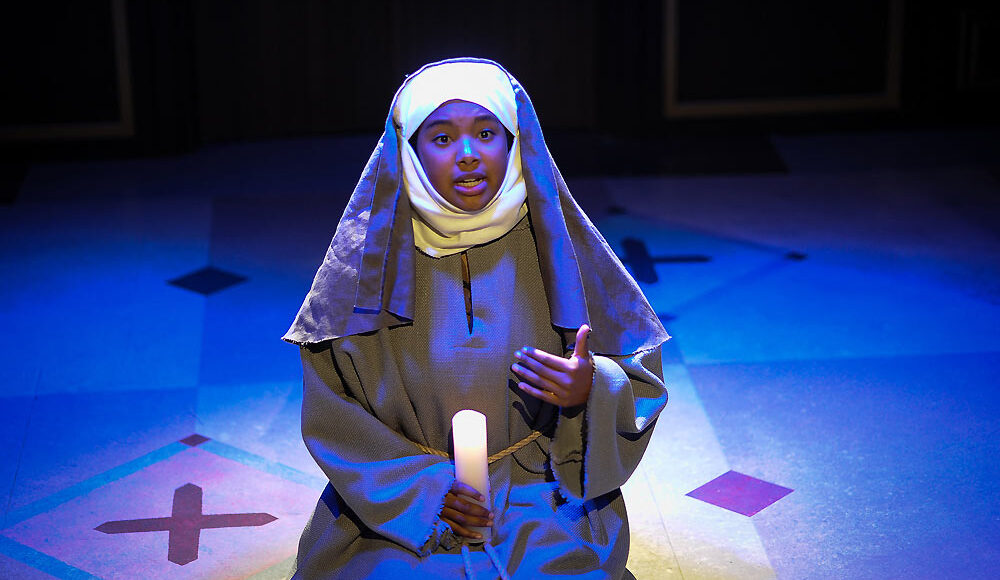By Ernest Kearney — The story of Chiara Offreduccio is one of the most beloved “ripping yarns” of the Catholic Church.
Born in 1194 she was the devout daughter of a devout wealthy aristocratic family who resided in Assisi nestled among the Apennine mountains of central Italy.
Chiara, also known as Clare, came under the religious sway of a fellow townsperson Giovanni di Pietro di Bernardone better known today as Saint Francis of Assisi founder of the Franciscan Order.
Clare sought out Francis after hearing him preach and implored him to help her create a religious order similar to his but for women, resulting in the Order of Poor Ladies, one of the most austere orders of the Catholic church. An order dedicated to prayer, penance and strict poverty.
Clare’s holy career has all the hallmarks good Catholics expect from their saintly superstars. Rejection of wealth and privilege, overcoming family resistance to her choice of the monastic life, battles with various popes to maintain her order’s independence, miraculously saving her city from sacking by repulsing marauding armies thru her power of prayer, then after a long life of service and self-sacrifice passing away with final words dripping piety, followed by canonization, the Vatican’s equivalent of getting a star on Hollywood Boulevard.
After leading her sisters for 41 years, Clare was confined to her cell during her final illness. There she prayed to God to allow her to witness the Christmas mass that was being held in the chapel and suddenly the stone wall of her dark cell was illuminated with bright light and in the midst of that glow Clare could see the mass as it was being conducted; hence Clare has been officially designated the patron saint of television.
In Chiara Atik’s Poor Clare currently being staged by the Echo Theater Company, the story of the playwright’s namesake has been stripped of most of the 12th century trappings associated with the High Middle Ages and reoutfitted as a Valley girl plucked from the San Fernando Valley last Wednesday.
On a lovely set by Amanda Knehans resplendent with Gothic flourishes, Clare (Jordan Hull) and her sister Beatrice (Donna Zadeh) chatter with their servants Alma (Kari Lee Cartwright) and Peppa (Martica De Cardenas) with the cadence and diction that one would encounter if accidently entering the Fabulous Hair Beauty Salon in Sherman Oaks. Clare’s encounter with the young Francis of Assisi (Michael Sturgis) is not that of a young believer finding her religious mentor but of two BFFs hanging out.
Atik has taken this Renaissance tale of spiritual awakening and layered over it the veneer of our own materialistic modernity.
Clare assures us, “I am so down with the poor.” While her mother (Ann Noble) assures us there is no reason to feel angst about being so well-heeled while others are so poor, “You can be rich and pious – look at the pope.”
But while Poor Clare is bedecked with wit it is, overall, perplexing.
One senses the playwright’s intentions were noble. Perhaps she wished to rattle her audience’s consciousness by contrasting Clare’s awakening to the plight of the poor against their own dismissal of the rows of tents found beneath freeway overpasses throughout the city. If this was the playwright’s objective, sadly she fails.
Her “dramatic device” is draped over her narrative, not sculpted, and therefore comes across as gimmicky and little more.
The issue of the homeless and the economic inequality that plagues this country demands more than the playwright has brought to the stage. While this show will certainly appeal to any who hold the opinion “Homelessness is Bad,” it will not inspire others.
The Echo Theater Company is a first-rate producing body and with Kelly Beech, Rachael Zambias and Chris Fields on hand, they have done an excellent job in the staging of Poor Clare.
Director Alana Dietze has done superb work, as have Dianne K. Graebner with the period costumes and Azra King-Abadi with the lighting design and Jeff Gardner with his sound orchestration.
There are solid performances, but the highpoints are from lesser-used actors such as Ann Noble, who is, as always, a joy to watch as Clare’s mother. But for the truest moment of the play the credit must be given to Tony DeCarlo as “The Begger” who in one moment was able to shame the audience in a way in which the entire play was unable.
Michael Sturgis’s Francis was likeable, but “likeable” is not an adjective readily applicable to saints.
Hull as Clare was capable as the callow demoiselle, but the playwright hasn’t chiseled the course her character travels with the needed depth or dimension. What is supposed to be her grand declaration at the play’s end meant to stir the audience like Agate’s calling on the workers of the world to “strike,” or Howard Beale raging “I’m as mad as hell,” fails.
There is an old adage: “No crying in the writing, no tears in the reading.”
Poor Clare, to me, seems to lack any passion over an issue we all should be passionate about, and is so lightly shrouded that, sadly, it will change no minds, nor effect any changes. At best it will entertain.
Somewhat.
* * *
Poor Clare
is onstage with performances
Fridays and Saturdays at 8 p.m.; Sundays at 4 p.m.; and Mondays at 8 p.m.
thru Nov. 29
at
Atwater Village Theatre
3269 Casitas Ave
Los Angeles, CA 90039.
On-site parking is free.
For reservations and information,
call (310) 307-3753
or go to
www.EchoTheaterCompany.com
____________________________________





